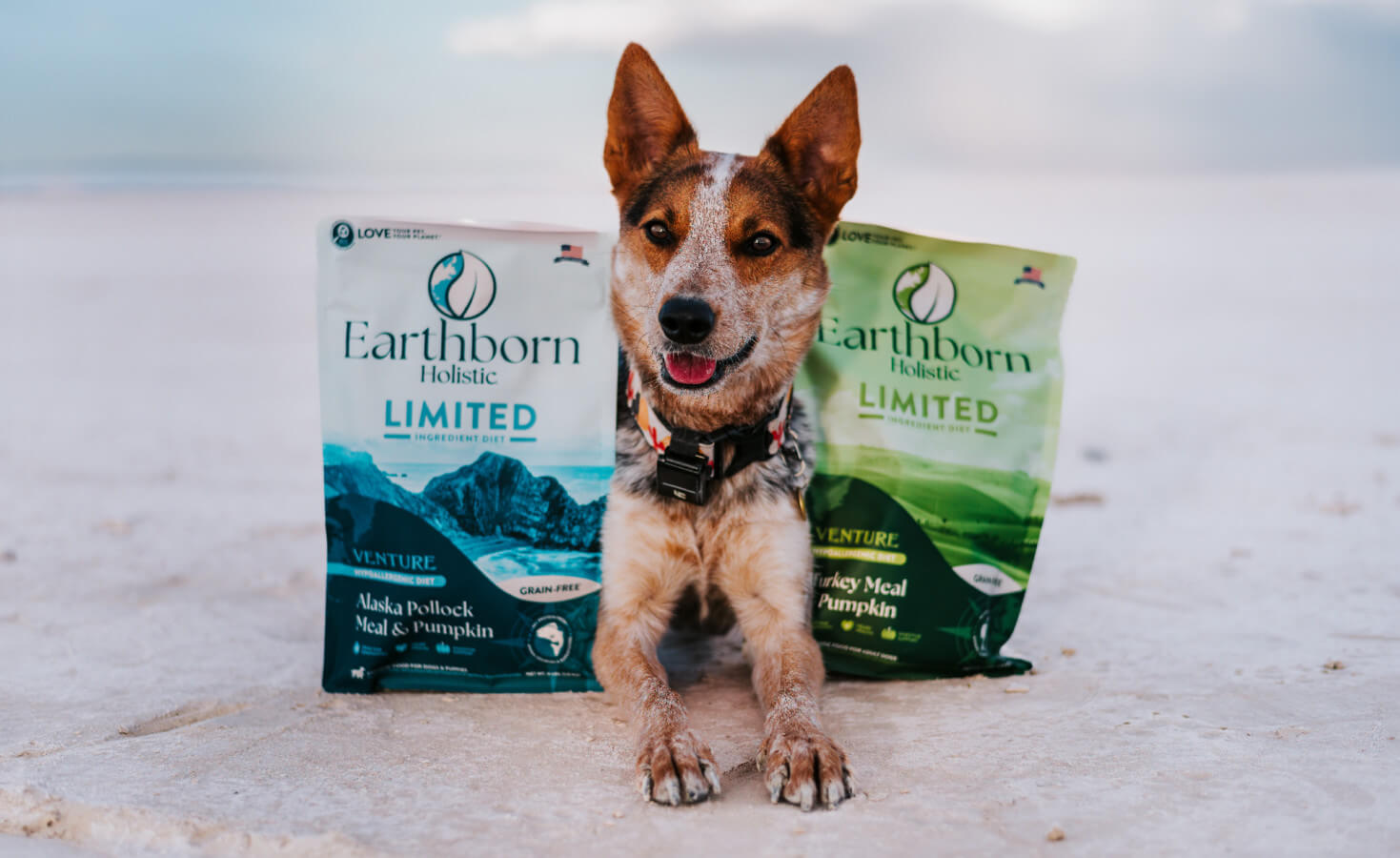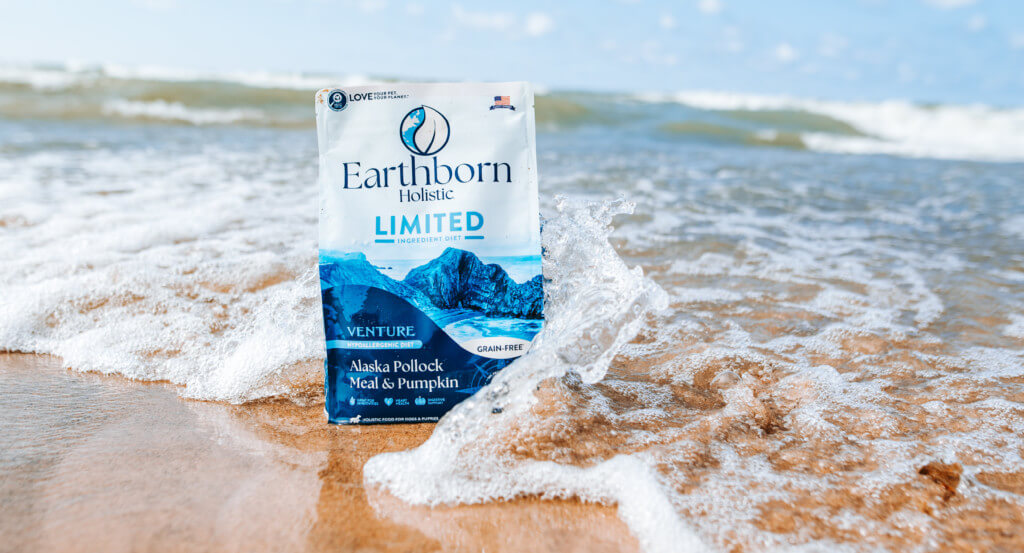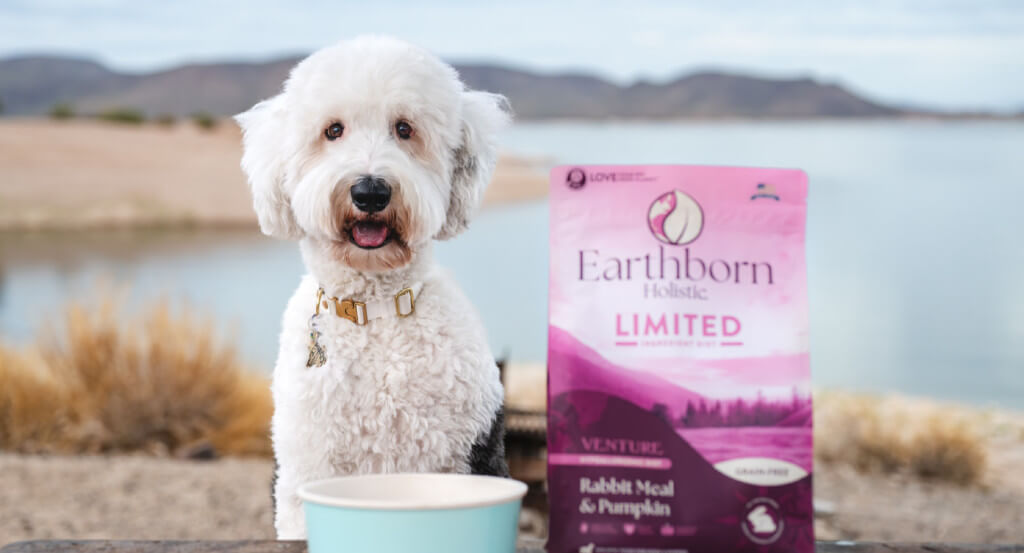Limited Ingredient Dog Food: The Best Dog Food for Dogs With Allergies
If you’ve determined that your dog has allergies, you may be wondering what to do next to help your dog find some relief. While finding a quality dog food can’t help with all allergies your dog may be experiencing, finding a dog food for dogs with allergies might be the solution to your problems if your dog is allergic to an ingredient in their food. Read on to figure out whether or not a limited ingredient dog food for allergies is something you should consider for your dog to help ease their allergy symptoms.

Does My Dog Have Allergies? Do I Need to Consider an Allergy Diet for Dogs?
“Why is my dog itching so much?” “Why is my dog’s skin so dry?” “Why does his food make him sick?” If you find yourself asking these questions often, they may be signs of dog food allergy symptoms. If you think your dog might have allergies or a dog food intolerance, getting to the bottom of it is super important and could provide your dog with some serious relief.
Allergy relief for dogs can come in many forms, but it’s a decision best made with the help of your vet. They will be able to determine if your dog has a full-blown allergy or just an intolerance, and help you determine what the specific allergen is so you can avoid it. If your dog is allergic or has an intolerance to a food ingredient, switching dog food to a recipe that doesn’t include that ingredient will usually do the trick. In cases where your dog has developed multiple allergies or intolerances, your vet will probably recommend switching to a limited ingredient or allergy diet for dogs from the start.
Environmental allergies in dogs are also common and your vet can help you determine ways to help manage these as well. Things like dust, pollen, mold, or other things found in the environment can be allergens for dogs and while a dog food might not be able to help relieve some of the symptoms caused by these allergens, your vet can use things like prescription antihistamines to help manage your dog’s symptoms.
Signs You May Need to Consider Dog or Puppy Food for Allergies
According to PetMD, dog upset stomach symptoms can be any of the following:
- Decreased appetite or loss of appetite
- Fatigue
- Drinking less water
- Seeming depressed
- Looking uncomfortable and stretching more often (like they are attempting a downward dog)
- Gulping to combat reflux
- Licking their lips, the air, or objects
All of these symptoms along with others like dog bloated stomach, dog upset stomach, diarrhea, or if your dog is lethargic and not eating are all signs you may need to take another look at what’s in your dog’s bowl. While this could be a sign of a dog food intolerance or allergy, it could also be a sign of other health issues which is why it is so important to work with your vet when making any kind of medical diagnosis when your dog is sick–allergies or sensitivities included.
Protein for Dogs With Allergies: Signs Your Dog Is Having Too Much Protein
When it comes to your dog, protein is something that we typically think of wanting to have a lot of in their diet. However, too much of a good thing can also have consequences. According to PetMD:
“Protein is a calorie dense nutrient and many of the high protein diets are extremely high in calories and can quickly lead to weight gain. With over 50% of dogs in the U.S. considered overweight or obese, dog owners need to be aware of where those extra calories are hiding. If a dog has kidney or liver issues consuming too much protein can increase the workload on these organs and upset the balance of nutrients leading to exacerbation of disease.”
That being said, they go on to say that you should look for a food formulated for your dog’s lifestyle–some dogs should have more protein in their diet! This is yet another reason why you should take your dog to the vet often, as your vet will be able to recommend a diet that works for your dog’s size, breed, and energy level.
What Is an Elimination Diet and How Can it Help You Determine the Best Dog Foods for Allergies?
If you suspect your dog may have an allergy, you should take them to the vet first and foremost. If they agree a food allergy might be an issue, they may suggest a dog elimination diet prior to attempting something like a limited ingredient dog food. Elimination diets are a great way to determine what foods are causing an allergic response in your dog. Whole Dog Journal has a great method for starting an elimination diet to determine what your dog is allergic to, as well as finding ingredients your dog can eat without a reaction moving forward:
“The first step in a food-elimination trial is to think hard about all the types of food you have fed to your dog, and then gather the ingredient lists for all commercial foods the dog has received, or foods you have included in his home-prepared diet. Write down (or list in a spreadsheet) all of the ingredients in the foods your dog has eaten. While it may be difficult to recall (or impossible, in the case of dogs who were adopted as adults) every food a dog has eaten in his lifetime, all of the ingredients in the diets that the dog has received most recently should be included on the list.
“You now have a working list of the ingredients you will avoid when selecting foods for the dog’s elimination diet.
“The goal for the first stage of the trial is to find ingredients that the dog has never received, in order to find some to which he is not allergic. You will then start him on a diet of these “novel” ingredients, in hopes that his itching reduces and then stops, indicating he is no longer eating something to which he is allergic, and that he is not allergic to any of the novel ingredients.
“If his itching and other dog food allergy symptoms stop, you can begin adding other ingredients back into his diet, one at a time. If the itching recurs, the most recently added ingredient is then put onto your dog’s list of forbidden foods.
“Ideally, an elimination diet initially consists of just one protein source and one carbohydrate source, neither of which appears on the list of foods your dog has previously eaten.”

If you’re looking for how to help a dog’s upset stomach caused by potential food allergies, an elimination diet that helps you figure out what your dog is allergic to can be a great first step. All sorts of allergies like chicken allergies in dogs and grain allergies in dogs can be discovered by doing an elimination diet. However, there is a chance that your dog may not have allergies and instead just has a sensitive stomach.
If your vet thinks an elimination diet is a bit extreme for a first step, they may suggest trying a sensitive stomach dog food like our Coastal Catch or Meadow Feast recipes first. When it comes to what to feed a dog with an upset stomach, an easily-digestible protein for dogs with allergies like lamb or fish is recommended. If switching to a sensitive digestion dog food recipe doesn’t do the trick, then allergy testing or an elimination diet may be in order.
What Is Limited Ingredient Food for Dogs?
The best dog food for dogs with allergies is typically a limited ingredient diet. Usually grain-free dog foods, limited ingredient diets are popular for their protein alternatives that dogs typically haven’t had a chance to develop allergies to like duck or rabbit.
Limited ingredient food for dogs also feature a shorter, simpler ingredients list and fewer ingredients that dogs are typically allergic to. For example, our limited ingredient holistic dog food recipes don’t contain any grains, chicken, eggs, gluten, or potatoes. Not having these ingredients included paired with proteins like rabbit, turkey, and Alaska pollock make these limited ingredient diets some of the best limited ingredient dog food recipes, as the chances of your dog being allergic to the short ingredients list are low.
In general, it’s not recommended to feed a limited ingredient diet unless it’s a veterinarian-recommended dog food, meaning your vet has determined your dog does in fact have allergies and recommends a limited ingredient dog food. This is because limited ingredient diets typically contain novel proteins, which we’ll talk more about later.
Limited Ingredient Dog Food for Allergies
When looking for the best dog food for dogs with allergies, a limited ingredient dog food is often the best option when it comes to finding some relief for your dog. Things like a chicken allergy in dogs can sometimes be helped by a change in protein, but if your dog has multiple allergies, a limited ingredient dog food for allergies is usually the way to go. If your dog is allergic to chicken, any of our limited ingredient recipes can help you find your dog some relief. These chicken-free recipes are instead made with proteins like rabbit, Alaska pollock, and turkey.
If your dog doesn’t necessarily have allergies but still has a sensitive stomach, finding dog food with a fish or rabbit protein might be a good solution. Fish and rabbit is good for dogs who have sensitive skin or stomach issues.
What Can You Usually Find in the Best Dog Food With Limited Ingredients?
Limited ingredient diets are popular for dogs with allergies because of their unique protein alternatives. While you don’t often see things like pollock dog food or rabbit dog food all over the shelves in your local pet store, unique proteins like these are very popular in limited ingredient diets. This is because these proteins, or novel proteins, are ingredients your dog hasn’t been exposed to before. Therefore, your dog likely hasn’t been able to develop an allergy to it unlike more common proteins like chicken and beef. Pollock dog food like our Venture Alaska Pollock Meal & Pumpkin recipe is another popular protein choice for some of the best dog food with limited ingredients because it’s known to be better for sensitive stomachs.
While looking a limited ingredient diet dog food you’ll also typically find many grain-free dog foods. Some dogs are actually allergic to grains, so many limited ingredient recipes are grain-free to help those dogs find relief as well.
What Other Problems Can Dog Food With Limited Ingredients Solve?
Dog food with limited ingredients is known to be great for allergies, but that’s not the only thing it’s good for. Sometimes sensitivities can also be helped with limited ingredient dog food. While most dogs only develop a sensitivity to one or two ingredients (if any) there are some cases in which your dog can be sensitive to a multitude of ingredients even though they don’t have an actual allergy. In these cases, a limited ingredient holistic dog food recipe can provide your dog with relief from symptoms of sensitivities like dog itchy skin or dog vomiting.
Is There a Difference Between Limited Ingredient Dog Food and Grain Free Dog Food? Does Grain Free Limited Ingredient Dog Food Exist?
There is a major difference between limited ingredient dog foods and grain-free dog foods. While many limited ingredient diets are grain-free dog food for allergies, grain-free recipes aren’t usually limited ingredient diets. If your dog is allergic to grains, a grain-free diet will probably help calm their allergies in the same way a limited ingredient recipe would.
However, if your dog has multiple allergies a grain-free dog food might not help very much and you might need to look into limited ingredient recipes (likely with different protein alternatives) instead. Limited ingredient recipes are typically made with a single animal protein and most are actually grain free limited ingredient dog food recipes, but some limited ingredient diets made for puppies sometimes will require another added protein to achieve the right levels of DHA needed to support your puppy’s growth and development.
In addition to proteins, limited ingredient dog food will also typically include a complex carbohydrate (our Venture recipes contain pumpkin and/or butternut squash. These carbohydrates aren’t often allergy triggers and they help your dog feel fuller longer because of the way your dog digests them. Because the most common complex carbohydrates are whole grains, grain-free holistic dog food diets will include similar carbs to most limited ingredient diets.

The Limited-Ingredient Diet for Dogs: Is it Right for My Dog?
The best way to determine if a limited ingredient diet is right for your dog is by talking with your vet. Sometimes a change in protein from a different holistic dog food recipe or added immune support for dogs may be all that you really need. If that doesn’t seem to be working well enough, your vet can help recommend the best limited ingredient dog food for your dog based on their specific allergies or sensitivities to make sure your dog or puppy is getting all of the essential nutrients they need.
Oftentimes, pups with really intense allergies make great improvements when starting on a limited ingredient diet for dogs. Owners often find their dogs itch less and see major improvements in their skin and coat as well. If you think a limited ingredient diet might help your dog’s allergies, definitely have a conversation with your vet to see if it’s a good idea to try switching.
If your dog does require a limited ingredient diet, you may be wondering about treats as well. Limited ingredient dog treats do exist, but other alternatives include using fresh foods like carrots, apples, blueberries, or apples as treats instead. These are common ingredients in your dog’s food and make for a tasty, single-ingredient snack in place of treats that could cause stomach upset.
Risks of Feeding Limited Ingredient Dog Food
A main risk of limited ingredient dog food is exposing your dog to novel proteins and giving them a chance to develop an allergy to those proteins as well. It’s not recommended to feed a limited ingredient diet unless it’s a veterinarian-recommended dog food for this reason. Exposing your dog to different protein alternatives early on when it’s not necessary increases the chances of them developing an allergy to it later on. If you’ve exposed your dog to a variety of proteins and they develop food allergies, finding a novel protein that your dog hasn’t been exposed to in order to treat their food allergies will be more difficult.
For this reason, the best protein source for dogs, in general, is typically a more common protein–think poultry, fish, or beef. If your dog does develop an allergy to any of these proteins, you’ll have more novel protein options to choose from like rabbit or duck that will have a better chance of helping to relieve their allergies.
Limited ingredient diets are not just for stomach sensitivities. Limited ingredient foods can also help with skin sensitivities. Similar to humans, when dogs are allergic to certain foods their skin reacts poorly, which is why finding the the perfect food for dogs with skin allergies or sensitivities is so important. A limited ingredient diet will help you determine what is causing your pup skin sensitivities.
With any dog food, it’s important to make sure the food you’re feeding has all the essential nutrients needed to support your dog’s lifestyle. This includes limited ingredient diets. If you have a puppy with allergies, for example, and are wanting to feed a limited ingredient diet, it’s imperative that you find a recipe that is created with your puppy’s nutritional needs in mind.
Choosing the Right Limited Ingredient Food For My Dog
When it comes to choosing the best limited ingredient dog food for your dog or puppy, you can’t go wrong with a high-quality holistic dog food like our Venture line.
If you have a dog allergic to grains and are needing grain-free dog food to curb their allergies, all of our Venture recipes would be a great option. For pet parents searching for sensitive stomach and skin dog food solutions but still want limited ingredients, our Rabbit Meal & Pumpkin or Turkey Meal & Pumpkin recipes will be even easier on your dog’s sensitive stomach and skin.
For younger pups, our Rabbit Meal & Pumpkin and Alaska Pollock Meal & Pumpkin limited ingredient puppy food recipes are formulated for all life stages and can help bring your puppy some much-needed allergy relief. These recipes both contain added Alaska Pollock meal to help provide essential nutrients like DHA to your puppy’s diet to help with their growth and development. They are also include of sunflower oil which a great source of Vitamin E and Omega-6 Fatty Acids to support their skin and coat, making it the perfect dog food for skin allergies too!
If you’ve found out your dog has allergies, figuring out the next step can be difficult. Learning what ingredients or allergens your dog is actually allergic to and then finding food to combat them can seem like a daunting process. However, if you work with your vet to determine your dog’s allergies and find a diet to address them, your dog can be well on their way to finding some much-needed relief. Whether it’s a simple change of protein in their food or switching them to a limited ingredient dog food for allergies, there are several ways changing your dog’s food can help with pesky allergies while keeping your dog happy and healthy.




